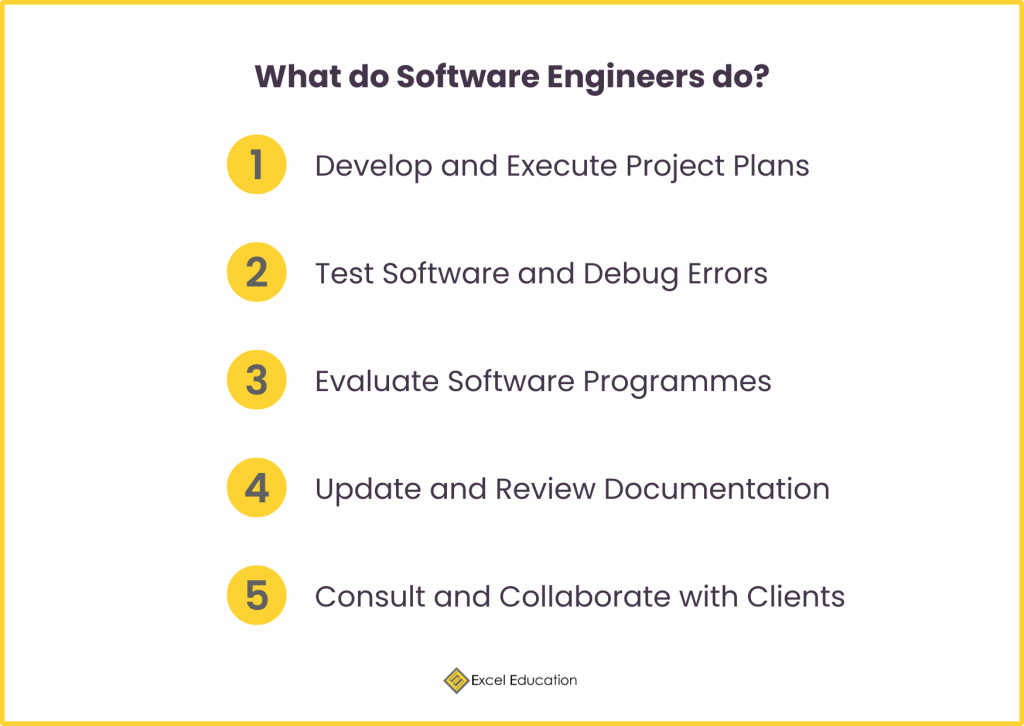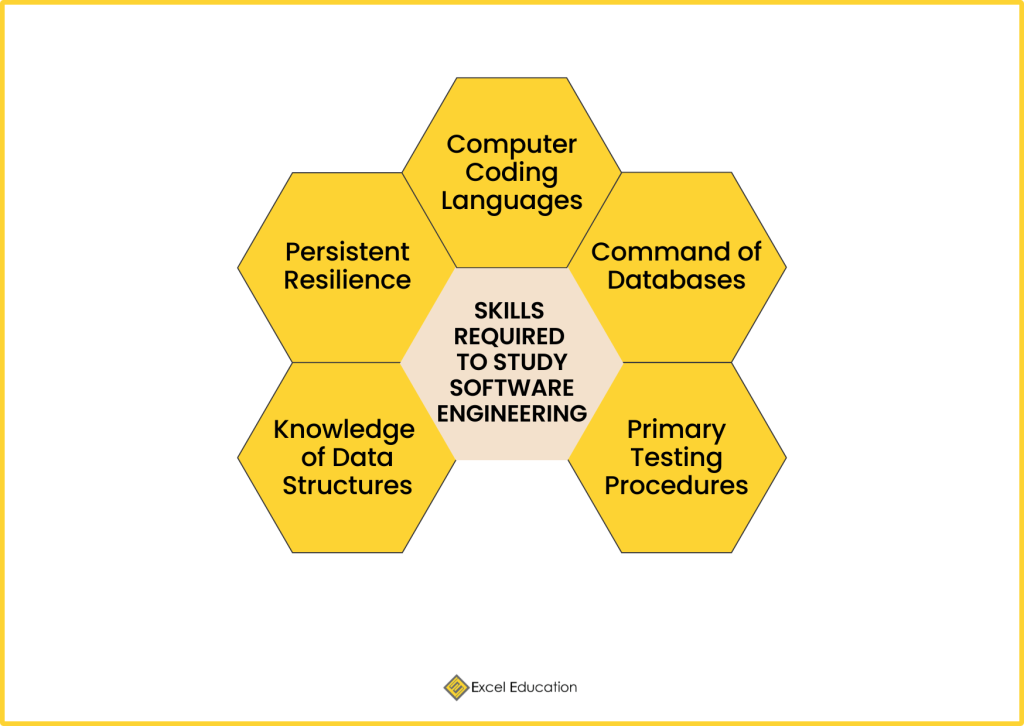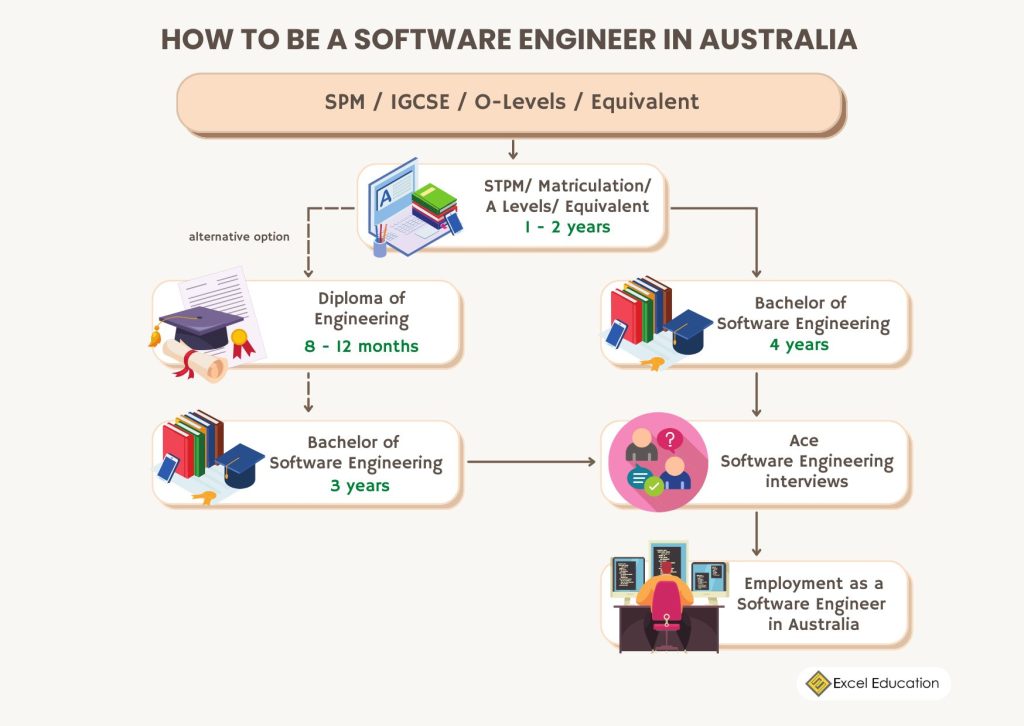
The field of Software Engineering is the cornerstone of our increasingly digital world. With hyperconnectivity in many aspects of life, the field has become so much more fundamental. Looking for a significant degree for this digital age? Software Engineering is what you’re looking for. This article will delve in notions of Software Engineering alongside recommended universities for you to study Software Engineering in Australia.
What is Software Engineering?

Software Engineering is about building effective Software systems that address complex problems in a broad range of domains including transport, communications, finance, medicine, science, and entertainment.
Some say Software Engineering is a narrower subset of computer science dealing with all the aspects in the stages of the software development lifecycle. These stages include the analysis, design, development, testing, and maintenance. Nonetheless, Software Engineering and computer science significantly differ from one another.
A major difference between the two is that Software Engineering primarily deals with the practical aspect of software development while Computer Science is more theoretical, focusing on how computers work and developing algorithms.
A career in Software Engineering allows for intellectually engaging challenges alongside flexibility to work in varying industries including manufacturing, finance, cybersecurity, healthcare, and even marketing. With increasing and rapid developments in technology, the demand for Software Engineers or Developers continues to grow, ensuring employability upon graduation.
The question is, what do Software Engineers do? Well, hop on because the upcoming section will elaborate the answer to that question.
What do Software Engineers do?

Duties of a Software Engineer may vary depending on their positions or role but generally, a Software Engineer might be responsible in carrying out the tasks listed below.
1. Develop and Execute Project Plans
Software Engineers develop projects where they outline the steps and processes needed to be taken in order to execute software projects such as project timelines, budget, or potential arising issues. Software Engineers can design and develop computer games, operating systems, business applications, or any other viable options.
2. Test Software and Debug Errors
Software Engineers would utilise Engineering principles with their knowledge of programming languages to build operational software for users. Also, Software Engineers are also responsible to implement and test their softwares as well as debug any errors or performance issues.
3. Evaluate Software Programmes
Software Engineers are in charge of monitoring in addition to evaluating software programmes and system performances. Software Engineers will conduct occasional inspections where they analyse system metrics, integrate code changes, and improve software quality.
4. Update and Review Documentation
Software Engineers have to update and review documentation when working on projects. Documentation, or software documentation, is done in order to ensure efficient and systematic completion of software projects where team collaborators could easily understand any code that is written.
5. Consult and Collaborate with Clients
Software Engineers develop solutions for problems faced by real people, in other words – their clients or stakeholders. In this regard, Software Engineers have the duty of consulting and collaborating with clients to understand their client’s needs and wants whilst ensuring codes and softwares are functional.
Software Engineer Skills Required

- Computer Coding Languages
Coding is fundamental in Software Engineering, making it important to have some background knowledge on different programming languages. These programming languages include Python, C++, TypeScript, and Java.
- Persistent Resilience
Many times Software Engineering is responsible for testing or fixing systems by finding bugs or errors in said systems. At times it might seem impossible due to the numerous amounts of trial and error needed but with persistent resilience in Software Engineering, these challenges are said to be the beauty of the field.
- Command of Databases
Databases are essential to store and retrieve data, making them a key aspect of a software or application development process. Plus, most Software Engineering projects will involve interactions with a database making the command of databases important in Software Engineering.
- Knowledge of Data Structures
Data structures are known to be like the fundamental building blocks of software systems. Hence, the knowledge of data structures will help in completing Software Engineering projects, particularly in finding optimal methods to solve or debug issues.
- Primary Testing Procedures
Software Engineering centre on problem solving where testing is an integral aspect. Testing in labs during your Engineering studies may feel tedious but it is a great opportunity to learn and practice before you step into the professional field of Software Engineering.
Software Engineer Careers option
Depending on interests and passions, there are various career options for Software Engineering graduates:
- Software Engineer
- UX Designer
- Software Tester
- Full Stack Developer
- Software and Applications Programmer
- Software Developer
- Web Developer
- Software Architect
- Database Administrator
- IT Project Lead
The reported average annual salary for a Software Engineer in Australia ranges from AU$110,000 to AU$130,000.
How to become a Software Engineer in Australia

According to Labour Market Insights by the Australian Government, careers as Software and Applications Programmers in Australia is deemed to be in demand with a strong projected growth of 27% (42,200) more jobs. As such, a career as a Software Engineer in Australia has a positive employment outlook. Here are general steps you can take to become a Software Engineer in Australia:
Step 1: After SPM or equivalent examinations, complete a pre-university programme which grants you entry into Software Engineering programmes in Australia
You also have the option of enrolling in a Diploma of Engineering in Australia, taking up 8-12 months. This alternative route would enable you to gain entry to the second year of a Bachelor of Software Engineering programme in Australia. However, this is highly dependent on your scores and the institution you are enrolled in.
Step 2: Enrol into an accredited Software Engineering undergraduate degree. This step could take up to 4 years. Though, with a Diploma of Engineering, this step would take up 3 years. Accreditations for Software Engineering programmes in Australia are typically granted by Engineers Australia (EA) or the Australian Computer Society (ACS).
Additionally, in this stage, you should build your portfolio and boost professional developments as it would benefit when applying for full-time careers upon graduation.
Step 3: Ace Software Engineering interviews (which usually have coding assessments) and join employment as a Software Engineer in Australia.
One road to Permanent Residency (PR) in Australia is through occupation as a Software Engineer. Software Engineers are under the Medium and Long-term Strategic Skills List (MLTSSL) where an occupation is projected to be in demand for medium to long term duration. Software Engineers under MLTSSL have the opportunity for migration to Australia such as via the subclass 494 (Skilled Employer Sponsored Regional (Provisional) visa. Keep in mind there are other visa subclasses that you may apply for.
When you are eligible to apply for permanent residency, you can apply for permanent resident visa such as subclass 189 (Skilled Independent) or subclass 190 (Skilled Nominated). The choice of visa may vary from occupation, eligibility, regional preference and wish to acquire permanent residence.
General Entry Requirements to Study Software Engineering
Academic Entry
Do take note that most Software Engineering programmes have a Mathematics subject prerequisite.
Academic Entry | Minimum Score |
STPM | Aggregate of 9 |
Matriculation | CGPA 2.50 |
A-Levels | Aggregate of 9 |
UEC | Grade Average of 4.4 (Best 5 Subjects) |
IB Diploma | 28 |
Australian Matriculation (ATAR) | 80 |
Canadian Pre-University (CPU) | 70 |
Note: Universities may have different requirements. To learn more, get in touch with us!
English Language Entry Requirements
Entry Level | Minimum Score |
IELTS | 6.5 |
TOEFL | 79 |
Pearson Test of English (PTE) | 58 |
Note: Universities may have different requirements. To learn more, get in touch with us!
Top Universities to Study Software Engineering in Australia
1. University of Sydney (USYD)

The University of Sydney, additionally referred to as USYD, was founded in 1850. USYD is Australia’s oldest university, as reflected by its sandstone exterior design. The University of Sydney was ranked 19th among universities worldwide in 2024 and is a member of the Group of Eight (Go8) network, marking it as an ideal study destination option.
For those wanting to academically pursue Software Engineering, consider the accredited Bachelor of Engineering Honours (Software Engineering) programme at the University of Sydney. Prospective students will learn the foundations of software in computer games, business applications, operating systems, and network control systems, and gain access to professional engagement activities as well as work experience in their final study year to boost employability.
Programme Offered | Bachelor of Engineering Honours (Software Engineering) |
Duration | 4 Years |
Intake | February, July |
Indicative Fees (2024) | International Students: AU$224,000 |
Contact us right now for a free consultation if you’d like more details about the costs, the format of the programme, and the entry requirements!
2. Australia National University (ANU)

The Australian National University, abbreviated as ANU, is a renowned university in Australia. The university has history dating back to 1929 and among universities globally, ANU was placed in the 34th rank, proving their dedication as an education provider to the masses.
The Bachelor of Engineering (Honours) in Software Engineering programme by the Australian National University covets on a multidisciplinary systems approach, where both technical and socio-technical aspects of Software Engineering are covered. The accredited programme incorporates opportunities for work experiences alongside Engineering projects and courseworks to nurture technical skills.
Programme Offered | Bachelor of Engineering (Honours) in Software Engineering |
Duration | 4 Years |
Intake | February, July |
Indicative Fees (2024) | International Students: AU$203,040 |
Contact us right now for a free consultation if you’d like more details about the costs, the format of the programme, and the entry requirements!
3. Macquarie University

Macquarie University, founded in 1964, is a notable public higher education learning institution located in Sydney, Australia. With five faculties offering a range of undergraduate courses and a ranking at the 11th spot among Australian universities, Macquarie is a suitable choice for those interested in studying Software Engineering.
Macquarie University offers a Software Engineering specialisation under their Bachelor of Engineering (Honours) programme, where students learn concepts relating to the design, development, and performance of software systems through a hands-on learning experience. The programme embeds opportunities to participate in student-led projects and internships.
Programme Offered | Bachelor of Engineering (Honours) Specialisation in:
|
Duration | 4 Years |
Intake | February, July |
Indicative Fees (2024) | International Students: AU$172,800 |
Contact us right now for a free consultation if you’d like more details about the costs, the format of the programme, and the entry requirements!
4. Queensland University of Technology (QUT)

Queensland University of Technology, rather QUT, is a notable public tertiary learning institution with history dating back to 1849. Queensland University of Technology has made its mark in academia, proven through its rank in the top 15 among universities in Australia for the year of 2024.
Queensland University of Technology offers an accredited Bachelor of Engineering (Honours) (Computer and Software Systems) for those interested in studying Software Engineering. The programme implements a practical approach to learning where students can work on real-world Software Engineering projects aided with advanced computer labs and their expert technical team.
Programme Offered | Bachelor of Engineering (Honours) (Computer and Software Systems) |
Duration | 4 Years |
Intake | February, July |
Indicative Fees (2024) | International Students: AU$169,600 |
Contact us right now for a free consultation if you’d like more details about the costs, the format of the programme, and the entry requirements!
5. Curtin University

Curtin University is a distinguished public research university which was inaugurated in 1966. Curtin University is a reputable study destination, noting their ranks in the top 15 among universities in Australia for the year 2024 as well as their globally recognised innovative courses and programmes.
The Software Systems Engineering major is embedded in Curtin’s accredited Bachelor of Engineering (Honours) programme, where students are granted a learning experience relating to computer-based systems. Plus, students will gain chances for a final year research project as well as substantial professional practice at a comparatively affordable price point.
Programme Offered | Bachelor of Engineering (Honours) Major In:
|
Duration | 4 Years |
Intake | February, July |
Indicative Fees (2024) | International Students: AU$150,029 |
Contact us right now for a free consultation if you’d like more details about the costs, the format of the programme, and the entry requirements!
For more information regarding the university, programme offered, entry requirements and fees, contact Excel Education.
About The Author

Hannah Hir
Hannah appreciates various art forms, especially Asian literature, film and music. Most of her favorite Malaysian kuihs are green-coloured.

